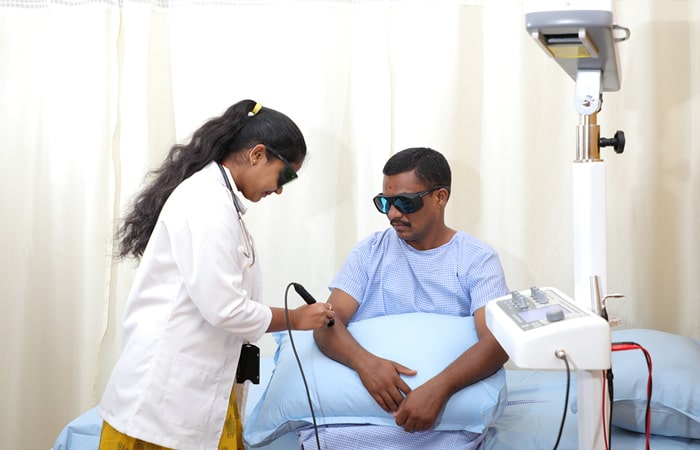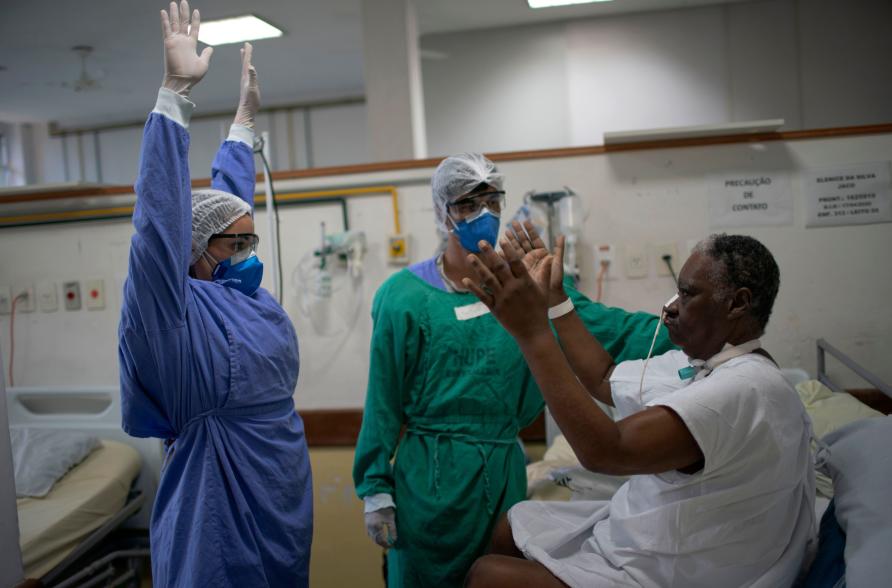
Role of physiotherapy in covid-19?
COVID-19 is a disease caused by a new coronavirus called SARS-CoV-2.”WHO” first learned of this new virus on 31 December 2019, following a reportof a cluster of cases of ‘viral pneumonia in Wuhan, People’s Republic of China! Did you guys know, that the role of Physiotherapy in COVID-19 can be veryvital? This Virus tends to affect the respiratory system and leads to Pneumonia in
severe cases. With many viral mutants coming up, it was seen that the virus was affecting multiple systems and Disease presentation started varying.
Around 80% of people would heal without hospitalization. Those needing hospitalization were the individuals who had the more severe disease or those with co-morbid conditions.
At Acharya, we are one of the top Physiotherapy colleges in Bangalore, we aim to offer the best physiotherapy program in Bangalore.Comorbid conditions are those conditions that the increasing severity and risk of mortality in many diseases. The most common comorbid conditions are diabetes mellitus, rheumatoid arthritis, Asthma and Heart conditions. These diseases themselves affect the overall health of the person and when his or her system gets burdened with COVID, the system finds it difficult to fight against the virus and the person succumbs to deconditioning.
The most common symptoms of COVID-19 are.
- Fever
- Dry cough
- Fatigue
Other symptoms that are less common and may affect some patients include
- Loss of taste or smell,
- Nasal congestion,
- Conjunctivitis (also known as red eyes)
- Sore throat,
- Headache,
- Muscle or joint pain,
- Different types of skin rash,
- Nausea or vomiting,
- Diarrhoea,
- Chills or dizziness.
Symptoms of severe COVID‐19 disease include
- Shortness of breath
- Loss of appetite
- Confusion
- Persistent pain or pressure in the chest
- High temperature (above 38 °C).
Other less common symptoms are
- Irritability
- Confusion
- Reduced consciousness (sometimes associated with seizures)
- Anxiety
- Depression
- Sleep disorders

More severe and rare neurological complications such as strokes, brain inflammation, delirium, and nerve damage. People who suffer from COVID infection, irrespective of whether they have to
get hospitalized or not may show certain common complaints. These are seen in most Viral infections but are overtly exaggerated in Covid. These symptoms are Fatigue, Respiratory and Neurological symptoms and Body ache. Many patients would be anxious about reaching the pre-infection physical status too. The fact that Isolation and Quarantine are ways to prevent the spread of disease is well known. However, what remains behind the curtains is the effect of this disease on mental health. Isolation and quarantine have their own effects on the mental well-being of people. This gets further accentuated by the lack of exposure to the sun and its healing rays. The ongoing research in medical and quick updates in practice guidelineshave helped in the control of the disease process. t has also helped inreducing mortality. Patients undergoing ICU stay too have been recovering very well with the help of medicines and Physiotherapy interventions. Physiotherapy aids in healing the body through nonpharmacological methods. It helps the patients in utilizing the untapped energy sources and helps in growing the energy levels in the patient. In the ICU, the physiotherapist helps the patient to reduce the breathlessness with relaxation techniques, positioning and may also help in weaning from the ventilator. Once the patient is medically stable, the mainstay is to mobilize secretions and get the infective phlegm out of the respiratory tract. This helps to better the oxygenation levels in the patient. The disease tends to weaken the respiratory system patients tend to get better over time,though withstiffness (fibrosis) in the lungs. These stiff lungs and the rib cage need to be mobilized or exercised to get them back to their own springy nature. The Physiotherapist aids in doing so thus helping the patient to optimize their breathing. Different breathing techniques advocated by the physiotherapists are not just limited to breathing exercise, active cycle of breathing, breath stacking but many more.
Patients hospitalised with COVID-19 are often those who are older or those with comorbid conditions. Some patients can also develop lung and kidney, cardiac and liver damage while in critical recovery. All of these factors influence their ability to recover and physiotherapists take into account all this information while planning their rehabilitation. Moving around and mobilization of the individuals with Covid starts right from ICU. Physiotherapists actively support movement and mobility in a patient and work on it right from the ICU days. During the ICU stay it may look as easy as turning in bed and sitting at the edge of the bed, however for a patient this is a herculean task. The saturation of oxygen and BP can vary during these mobilizations. The Physiotherapists are well trained to manage in such a scenario. They encourage people to continue with mobility and also plan and deliver programs for gradual improvement and progression inmobility through the course of recovery. The deconditioned patients may struggle in the earlier days, so physiotherapists will pace activity andpotentially see patients more often for shorter treatment sessions. Prolonged immobilization or bed rest not only causes stiffness in the body and also leads to weakness in major muscles of the body. These weaknesses make it difficult for a person to move around as well as tires the person drastically. A human movement to be fluent and effortless needs a balance between muscle strength, cardiovascular and muscular stamina and oxygen-carrying capacity of the blood. Developing and maintaining muscle strength and stamina are the mainstays of Physiotherapy treatment. Patients following a long stay in hospital may develop anxiety, low mood, depression, post-traumatic stress these are normal reactions to being critically ill. Many people do not know that moving lesser and not engaging in physical activity aggravates these conditions. Research has shown that physical activity and planned exercise programs help in uplifting mood, increasing immunity and overall wellness in patients.
During the recovery phase, it may not always be possible for patients to physically meet the therapist at the clinic, so physiotherapists all over the world have come up with Novel Methods of health care provision and education throughtherapy apps, telemedicine and other social apps. Nevertheless, the role of a physiotherapist as an educator can never be forgotten. The therapist educates the patient about lung and respiratory hygiene, deconditioning and emphasizes exercise and physical activity as an antidote for deconditioning effects. They educate the family and the community on the importance of exercise and general health maintenance. If the patient has morbid conditions and has queries about its management along with Covid-19 the therapist helps them to understand and relieves the anxiety associated. In short, relaxation techniques, respiratory hygiene techniques, strengthening protocols, mobility exercises, endurance training and a strong pulmonary rehabilitation program assist the therapists to guide and accompany the Covid patient to recovery and getting back to life.































